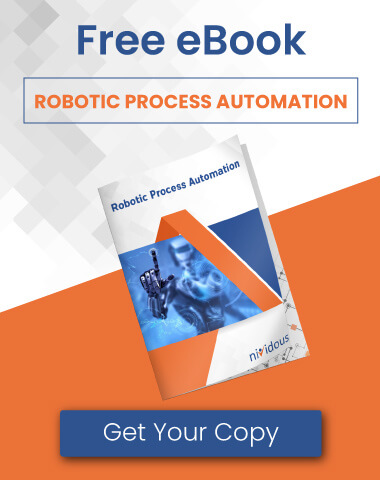At Nividous, our experts work with companies on implementing intelligent automation solutions every day. But we don’t disappear after the solution is in place; we always stick around to see the results and make sure our clients get the return on investment they were expecting. This means we get to see exactly what happens when businesses use our platform to reinvent their workflows.
Until this point, we have focused more on the benefits we provide to our client businesses rather than the effects of automation on a larger scale economy. But an interesting and undeniable pattern has emerged around inflation and automation, and we believe this link could be more important than most people realize.
What’s the connection between inflation and automation?
Automation can help individual companies stay competitive when inflation is rampant.
Any company that produces, transports, or delivers a product or service — which is pretty much every company in existence — incurs costs related to the activities they engage in.
Inflation tends to drive prices higher across the board, though a particular company’s costs may be higher or lower depending on the efficiency, accuracy, and speed of their processes.
For example, if a shipping company makes logistical errors and frequently routes packages through areas that are far out of the way, that company will pay extra fees for fuel and vehicle maintenance. They would also likely lose customers, who would switch to a company that delivers packages more quickly. These direct and indirect costs must eventually be passed on to the consumer in the form of inflated prices.
On the other side of the coin, improving business processes often brings costs down. When processes are optimized, there will be less unnecessary wasting of fuel and fewer errors that take time and financial resources to fix. Plus, customers will flock to a business that can deliver their goods quickly. A highly efficient shipping company can therefore afford to keep prices relatively lower than its competitors, even if the industry as a whole is struggling with inflation-induced issues such as expensive vehicle maintenance and high diesel costs.
A highly efficient shipping company can therefore afford to keep prices relatively lower than its competitors, even if the industry as a whole is struggling with inflation-induced issues such as expensive vehicle maintenance and high diesel costs.
The same is true for businesses across industries. Take a manufacturing company as another example. If a company manufactures products efficiently, with minimal waste, few quality control errors, and fast assembly times, that company will be able to make a higher volume of products for less money. The high supply and cost savings translate to lower prices on the consumer side and higher profits for the company.
Inflation may make the cost of components higher or make critical components harder to find than they otherwise would be, but those are problems all manufacturers of the product will experience at the same time. Having the most efficient processes and the least amount of wasted resources still keeps a company ahead of the curve.
As you’ve undoubtedly noticed, the key for these businesses is to improve efficiency, fix suboptimal workflows, and reduce errors. Conveniently, those are the exact results companies can expect from implementing an intelligent automation solution.
Automation can fight inflation stemming from supply chain issues.
Fighting inflation on a company level is one thing, but easing the stress on the entire nation’s economy seems like quite another. Interestingly, however, the same principles from above apply just as well to the broader economy as they do to individual companies. More efficient production on a mass scale equals lower prices for consumers.
However, there are some additional considerations when we’re talking about a large-scale economy that don’t necessarily translate to individual company strategies.
For instance, one of the drivers behind the inflation we’re experiencing as a country in 2023 is the ongoing supply chain crisis. The problems began with the pandemic, but have snowballed since early 2020. Not only are more people shopping online and expecting faster deliveries, but other issues — understaffing, the global microchip shortage, and the war between Russia and Ukraine — have made certain items hard (or even impossible) to obtain.
When we think of the microchip shortage, for example, it’s easy to understand why laptops and cell phones are so expensive for consumers. We tend to forget, however, that if shipping companies can’t find microchips, they can’t keep their vehicles running and in good repair. This is just one issue causing stress on the overall supply chain.
Logistics companies often have a huge need for automation. They’re handling intense workloads with minimal staff. But even if individual shipping companies optimized their internal productivity and streamlined their business processes, it wouldn’t immediately solve the problems brought on by a lack of affordable diesel or a fleet in disrepair. To fix these issues, widespread improvement of the overall supply chain would need to take place. Thankfully, automation is in a position to ease at least some of the burden.
Let’s look at one of our clients as a prime example. This company used to have an ERP system that required a lot of manual work. Employees would receive multiple orders and email updates, and they’d have to enter each new piece of information into the ERP system. Then, they had to manually choose which vehicle would be needed to transport the product, evaluate the safety risks associated with moving the product, determine the locations of the drivers and the other equipment that might be needed, and plan the most effective route and strategy.
Fast forward to now: This company handles its entire order management process with automation. Deliveries take a fraction of the time to plan, errors are largely nonexistent, and routes and driver locations are chosen with peak efficiency in mind.
On a small scale, this clearly has benefits for the profitability of the business. But on a larger nationwide or even global scale, logistics companies can all adopt these practices and streamline the shipping industry across the board. Reducing even some of the hang-ups in shipping could go a long way toward smoothing out other supply chain issues that stem from shipping difficulties.
Logistics companies can all adopt these practices and streamline the shipping industry across the board, helping to smooth out other shipping-related supply chain issues.
Automation opens the door for fiercer competition.
One more interesting effect automation can have on inflation is by increasing competition.
Without automation, it takes a lot of time, money, and expertise to start a new company. With the help of automation, more people can enter industries with a lower bar for startup costs and expert knowledge. Additionally, operating costs will be more manageable, because they can get away with hiring fewer people.
More players entering the field means more competition, and more competition naturally drives prices down.
Join the fight against inflation with an intelligent automation solution from Nividous.
Staying competitive when inflation rears its ugly head is much easier with intelligent automation in your toolbox.





